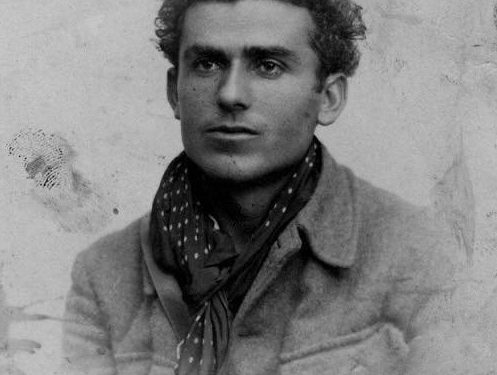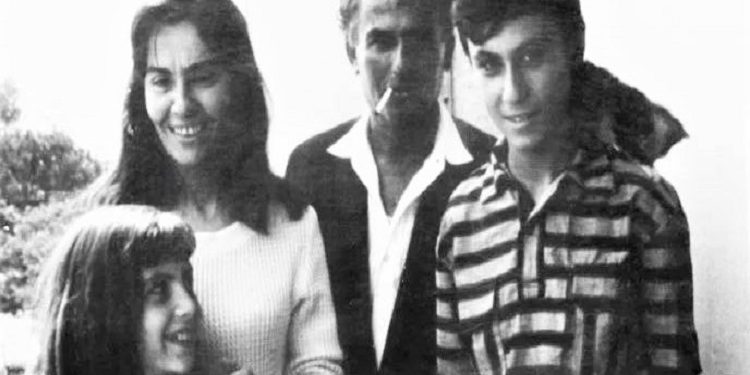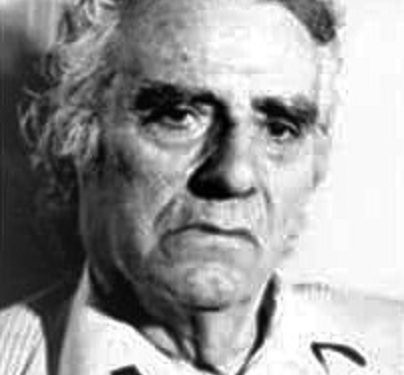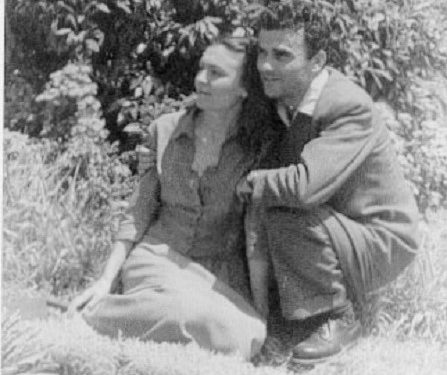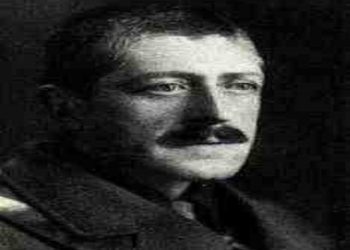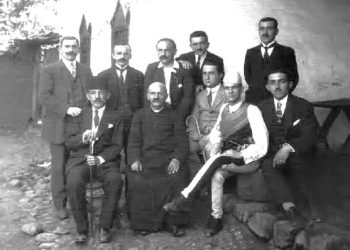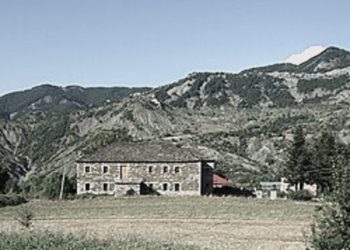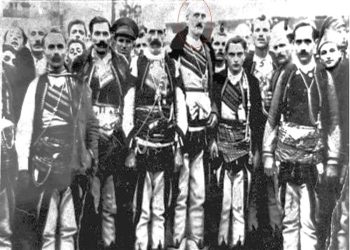By Petro Marko
Memorie.al / Petro Marko was born in Dhërmi in 1913. He started writing at a very young age and in 1936 he started publishing the magazine “ABC”, which was closed after a while by the authorities of the Zogu Monarchy. At that time he left Albania and went voluntarily to the Spanish War, where he joined the International Brigades. During this period, when he was in Madrid, he also worked on publishing the magazine “Volunteer of Freedom”. In 1940 he returned to his homeland, but in 1941, during the Italian occupation, he was arrested for anti-fascist activities and exiled to the island of Ustika in Italy. He returned to Albania in 1944 and in the last months of the war, he participated in partisan formations. After the war, he worked as editor-in-chief in the newspaper “Bashkimi”. In 1947, he was arrested and imprisoned, being accused of being an “agent of the Anglo-Americans”, because he had served for some time as a translator at UNRRA. He was released from prison in 1949 after the conviction of the Minister of Internal Affairs, Koçi Xoxes, but even after that the persecution against him continued again and for eight years the right to publish was banned. Even when this right was restored, the “vigilant eye” of censorship would be very attentive to his literary work. As one of the most important figures of Albanian literature, his work is well known not only in Albania, but also in Kosovo and beyond. Petro Marko passed away in Tirana in 1991. The text that we are publishing below is taken from the memoirs of Petro Markos written after the collapse of the communist regime in 1990-91 and it is about the period when he was arrested and kept in isolation in Tirana prison in 1947.
CRIME AGAINST UNIVERSAL CULTURE
– Memoirs of the writer Petro Marko –
I am suspended by my hands, bound by heavy chains that weigh down my shoulders, and I stand on the tips of my toes. A torture unknown to my body neither in the prison of King Zog’s regime, nor in that of the fascist occupier. This was a torture that was done to me in the spring of ’47 in my Albania, for the liberation of which I had devoted all the dreams of my youth. In my hallucinations during the torture, I surprisingly wrote a novel entitled “My Universe”.
Usually the door of the dungeon was opened and the interrogators insisted on the same thing: to accept and sign the “actions” of me and my friends, unknown. They repeated: This is the interest of the Party!
On such a day the door was opened and the guards brutally pushed an old man like Ghandi into my dungeon. He was not a rag, he was a man. He raised his head as he was lying on the ground, looked at me and uttered:
– “Petro Marko here? I was hoping for you. I wanted to write to you in order to clarify my position. I am innocent”.
I asked him: – Who are you?
He spoke Albanian with a foreign accent.
– “I am Professor Zuberi…”!
How I met Professor Zuber, the world-famous geologist…!
A team consisting of Nako Spiro, our distinguished geologist Andrea Xega, me, the journalist, and the great Zuber, who at that time was an advisor for geology to the government, went to Shkodër to search for sources of drinking water in Kopklik. Andrea Xega spoke to me at length and with great respect about the great and world-famous personality of geology, Zuber.
“Lenin, as far as I remember today, – said Andrea, took Zuber to Baku for the study of oil deposits”. In the common dungeon, Zuberi himself told me how in Baku they raised a bust of him as a sign of gratitude.
I always say, as far as I can remember today, the Great Anglo-Persian Oil Association engaged this geologist of exceptional ability to study oil deposits in the Middle East. He worked, discovered in the richest oil-bearing areas in the world. Make the geological map. He used to tell me these things himself during the heavy days and nights of the dungeon, where we spoke in a whisper. He muttered something to himself from time to time, lying on the cement, almost naked. He told me:
– “I am giving a lecture in the auditorium”!
Anglo-Persian, after Zuber completed the map for the Middle East, sent it to Albania, at the time of Zog. Zuberi studied the Albanian terrain palm by palm and made the first geological map of Albania. Discovered the existence of oil in the underground of Kuçova and Patos. Under his supervision the first wells yielded oil. Since Kuçova’s oil contained a large percentage of sulphur, as Zuber himself told me, the Anglo-Persians sold it to Mussolini.
Zuberi created the first Geological Museum in Kuçovo. I was accustomed to the broad culture of this great man, as strong as a fist. Here is his day in the dungeon: For hours he talked endlessly about problems in his specialty. For hours he prayed to God like the Polish Catholic that he was. He prayed in Polish. “I’m sorry,” he told me one day, “that I didn’t manage to finish a study that would prove to me whether the oil wells of Romanian Transylvania are related to the wells of Kuçova.”
The prison at night resounded with the piercing screams of those being tortured. They say that at that time the inhabitants of that area abandoned their houses.
Zuber was thinking. He told me: “These crimes that have involved people of culture and science, innocent people (we were talking about Andrea Xega, Mirash Ivanaj, Dhimitër Pasko, Dhimitër Dhespoti, Dr. Irfan Pustina, Arshi Pipa, Dr. Kadri Kirçik and many and many others, a long list of the Albanian intelligentsia) I think, have one goal: ignorance remains in power. I think even further. I believe that one of the leaders is an agent who acts against Albania”!
Another day of the countless, long days in the dungeon, Zuberi, after returning from the investigation in a state where his legs could not hold, told me: “They are torturing me; they want me to admit that I am an agent at all costs. I really want to say my intention, why I haven’t marked the gold deposits on the geological map of Albania. I say: there is some gold, but it takes twenty times the value in gold to extract the minimal amount that exists underground. For which country, Mr. handcuffed journalist, could I have saved that ridiculous amount of gold”?!
It was very painful to look at that old man, stuck in a skeleton. He hit his dry chest with his palm and said: – “I want to live; I want to go back to my Poland…”!
Although I suffered torture, I felt a moral responsibility as an Albanian, for this Polish citizen with universal cultural values, who was treated barbarically. I still have the shock of his tragic end to this day. The professor lying on the cold cement, murmured, or prayed and gave a lecture…! The door opens and a burly guard enters. Ask:
– “What is this, what is this misery”?
I say:
– He is a geologist.
– “What is a geologist”?
Zuber himself answered, almost without a voice.
– “He is the man who deals with the discovery of underground assets”. The guard laughed out loud, approached him, kicked him in the neck with his heavy military boot, and while writhing said to him:
– “Go underground and find us some wealth”!
I closed my eyes. The door slammed shut again. I didn’t dare to open my eyes. Hanging as I was, bound by chains, I could not make any movement to help the professor. When I opened my eyes I saw that he was standing motionless with his hands and feet broken and a thin trickle of blood was flowing from his lips. The great Zuber had given up.
I remembered Antonio Machado’s poem “Diamond” dedicated to the great Spanish poet Federico García Lorca, who was killed by the fascists. The title of the poem is “Crime in Granada”. Tears streamed down my parched face. I thought of dedicating a poem to Zyber with the title: “Crime in Tirana of tyrants”. A poem that I never wrote, a poem that would never be published. A poem that remained written in my soul.
After many years, I learned from our students returning from Poland that the Polish government was interested in the end of Zuber. I don’t know what answer he got. The students told me that in Bratislava, the faculty is named after the outstanding son of Poland, “Zuber”.
IN “AGENTS”
In memory of Hasan Rec
I lived on June 22 and it seemed to me that I had Hasan Reçi and hundreds of other comrades by my side who don’t even have a grave, because Enver Hoxha’s dictatorship eliminated them one after the other in the most criminal way, branding them with the most humiliating epithet “agents”. The enthusiasm of the masses from Rinas to the “Skenderbey” square, where the tribune was symbolically erected, in front of the monument of our legendary Hero Skenderbey, for the American Secretary of State James Baker, reminded me of the enthusiasm of the capital city on November 28, 1944, the day of liberation, when the victorious partisans brought the freedom and democracy they had fought for.
Excited even with tears in my eyes, they appeared to me resurrected, the “agents” at the forefront of the demonstration, and the victims of the first years after the liberation. Unprecedented persecution suffered families, children and even their grandchildren for four decades with the inhumane class war. I speak only to you today, dear brother Hasan. Seeing those hundreds of thousands of demonstrators, I imagined you in front of them, the hero of democracy.
Who is Hasan Reçi?
He is a fighter of the first ranks among the prominent anti-fascist constellation: I met him in the 30s with Mustafa Gjinish, Demir Godell, Bedri Pejan, Bedri Spahiu, Muharrem Pirdeni, Zef Mala, Vasil Shanto, Tajar Zavalan, Riza Cerova, Asim Vokshi , Hamit Shijakun, Sinan Gjonin, Wan Philip, and many others whom the dictatorship generally eliminated, but their ideal explodes today with democracy. Hasan Reçi was sentenced to death in 1935 in the Fier Movement.
From Paris, the Balkan Section of the Comintern, whose Albanian group included Llazar Fundo, Halim Xhelo, Koço Tashko, Omer Nishani, etc., with the help of the press trumpeted in Europe the severe punishments that the regime gave for the Fier Movement. The cream of European culture, such as Anri Barbys, Romen Roland, etc., was forced to intervene to save dozens of members of the uprising from being shot. The regime felt this pressure, pardoned the lives of those sentenced to death, changing the sentence to life imprisonment, except for the 11 gendarmes who were shot and to whom the revolutionary Halim Xhelo dedicated a poem, published in “Liria Kombëtare”, in Geneva, body of KONARE.
The Comintern published a postcard for Riza Cerova, who escaped and was killed by her followers. Also one such (postcard) was put into circulation by the Comintern with the portrait of Hasan Reç. In Spain, Albanian volunteers in their magazine “Volunteer of Freedom” published a photo of the battery commanded by Hulusi Spahiu and named “Bateria Hasan Reçi”.
With the occupation of Albania by Fascist Italy, all revolutionaries joined ranks to create resistance. Steps had been taken to create the Peza Squad. At the time when the uprising against the fascist Italian occupation broke out in Montenegro, fighter planes were loaded with bombs in the depots of our airfield. Hasan Reçi, as one of the leaders of the resistance, together with the young revolutionary Hamit Shijaku, thought to discover the warehouses of howitzers to destroy them, to help the Montenegrin people in the uprising.
The action was discovered and they were arrested. I was in Tirana prison, when they brought Hasan and Hamit tied up. A speedy trial was held. Both were sentenced to death. For Hasan, this was the second death sentence. As a well-known figure, personality of the resistance, he was not executed, in order not to revolt the masses, but his sentence was changed to life imprisonment. We were handcuffed to the steamer that took us to the islands and prisons of Italy. In Bari, they separated Hasan from us and took him to segregation in the “Santo Stefano” prison, a prison from which no one returned alive. Hamit Shijaku was hanged.
The dictatorial state made Hamit Shijak a martyr, but never a “Hero of the People” as he deserved. I think the reason is Hasan Reçi, with whom he carried out the action: Hasan Reçi was called an “agent” for the dictatorship.
When southern Italy was liberated by the Allied VIII Army of the Mediterranean, all political prisoners, Italian and foreign, were also liberated. The allies gathered all the liberated Albanians in a camp near Bari. The allied command learned that among the liberated was the famous fighter Hasan Reçi. He spoke English well because he had completed the American Technical School in Tirana. Hasani made contact with the Anglo-American allied high command, in order for it to help the National Liberation War of the Albanian people. The agreement was made and Hasan with an American representative and an Englishman left by submarine for Albania. They went out to Karaburun. (Hasan himself told me this after the liberation, when we met). They came into contact with the first partisans.
His first disappointment: The commander was a former lieutenant of the Kingdom, who in the Fern Movement had tortured the insurgents. Finally, the group reached the headquarters in Odriçan. From the Anglo-Russian-American anti-fascist coalition, only the Soviet envoy, Major Ivanov, was at the headquarters. Hasani presented the envoys of the Mediterranean Headquarters, communicated with the center through radio transmitters, informing that the Headquarters of the National Liberation War was happily waiting for the Anglo-American missions, which – as we know – were not long in coming. For the Albanian people, who gave everything for the liberation war and for a democratic government with the Anglo-Russian-American coalition that was the guarantee of victory?
The Albanian military mission was established in Bari, Italy. Allied aid in weapons and clothing began. Partisan wounded were treated in Bari. Among them the “People’s Hero”, Zylyftar Veleshnja, the partisan Liri Belishova, etc.
Hasan Reçi was included in the partisan brigades, I don’t remember which one. The headquarters of the National Liberation War sent Bedri Spahiu, Ramadan Çitak and Frederik Nosi to Kazerta, Italy, near the Mediterranean Headquarters. The agreements that were reached included the repatriation of all Albanians, the surrender of all collaborators with the occupier.
When I returned from Italy in October 1944 with 200 volunteers, including the talented painter, patriot and my dear friend Nexhmedin Zajmi, in Tirana I met Hasan, who often visited me in the offices of the newspaper “Bashkimi”, where I was the editor-in-chief. He, the “giant”, as we called him, friends, was assigned a ridiculous responsibility: in charge of the dormitories at the Ministry of Education. He spoke to me freely with a revolt that grew day by day: “Tell me what is happening like this, who is this Enver Hoxha, who raised him, who holds him and for what purposes?! What is this Tito for Albania, who enters our lives after the people’s war just like Mussolini?! His and Enver’s portrait in every office! I have the impression that there is betrayal in the leadership. This is not a “democratic government”, but a slave, totalitarian terrorist system. Do you understand anything? I am outraged. I am sorry that hundreds of villagers from Tirana come to me and say: “Hasan, help us.” We came with empty bags. We trust you”. What can I tell them?
I also understood something that many fighters, communists and democrats, those whom the people loved had given evidence, they were being discarded one by one, they were being beaten and executed, this starting with the establishment of the Party with “wings” and Tito’s “Slavic” orders through Popovic and Dushan Mugosha, friends and supporters of Enver Hoxha. We were eaten by sincerity: we only suspected, but we never managed to believe that there really was “a man” in the leadership, who was betraying the struggle and the trust of the people, managing to tear Albania apart for personal interests, for personal power without a doubt. The brutal separation with the Western allies was a historical crime.
All this was Machiavellian (our suspicions were confirmed today). The physical elimination of hundreds of honest and valuable comrades took incredible proportions. May ’47 was the peak of the bloody repression. Communist groups, old people, intellectuals and patriots were arrested. I remember the saying of an acquaintance of mine who had studied in France, who met his old friend, Enver Hoxha in the “Flora” store. “What are you looking for here, with the communists”? he asked. Enver replied: “I have entered among them; I will make you… the mother”!
And so it happened. Hasan and all those I mentioned above and many others, including myself, filled the prisons in 1947. Hasan Reçi was sentenced to death for the third time. But this times the “third truth”. His entire patriotic and revolutionary activity related to the people’s dream for a democratic Albania and a national liberation, connected and supported in the alliance not only with the east, but also with the Anglo-American allies, was called high treason.
On the first floor of the New Prison, across from my dungeon, Hasan was also in solitary confinement. Before the execution, we exchanged two words: “Anet the girl, she is 7 months old; you got out of here alive”!
Contemporaries, I turn to you and ask you: Who is the diabolical, monstrous mind that mercilessly oppressed the Albanian people that isolated them from the world, from life, that humiliated and exterminated their best sons and raised the glory on these ruins for half a century his personal? The file of the “author” of the half-century tragedy is “open”. I see that soon the sun of freedom will shine on the foreheads of those, on who in this half century only mud was thrown, as mud was thrown on the entire Albanian people.
Hasan Reçi, brother, and all you friends without graves! You Galip, Uan, Sinan, Spiro, Kola and all of you in a row, believe me, my soul was relieved today, that the day came that I could write these lines for you, thanks to democracy and true freedom that is dawning!
The new generation will write the “true history”! Memorie.al




